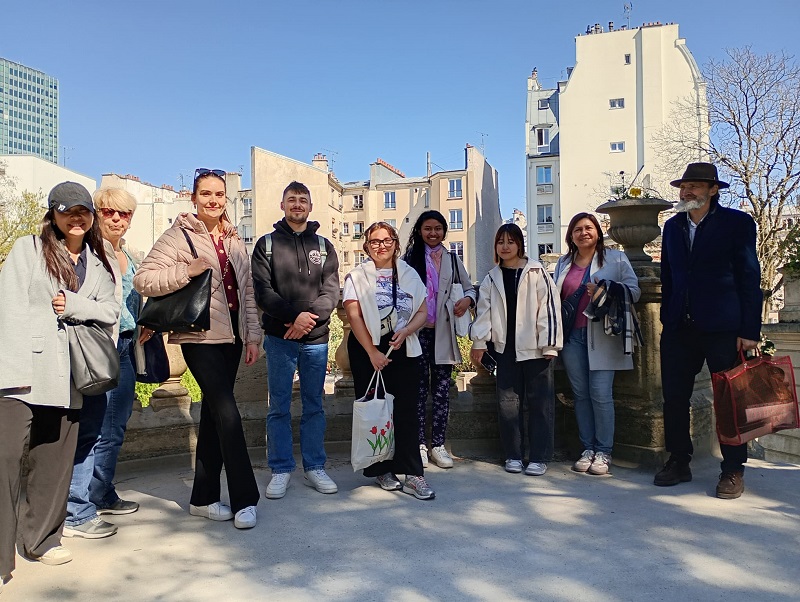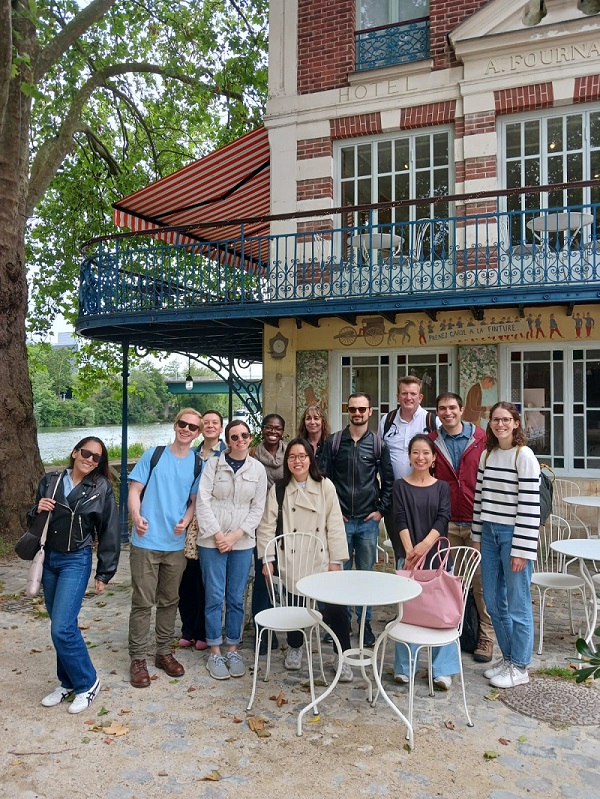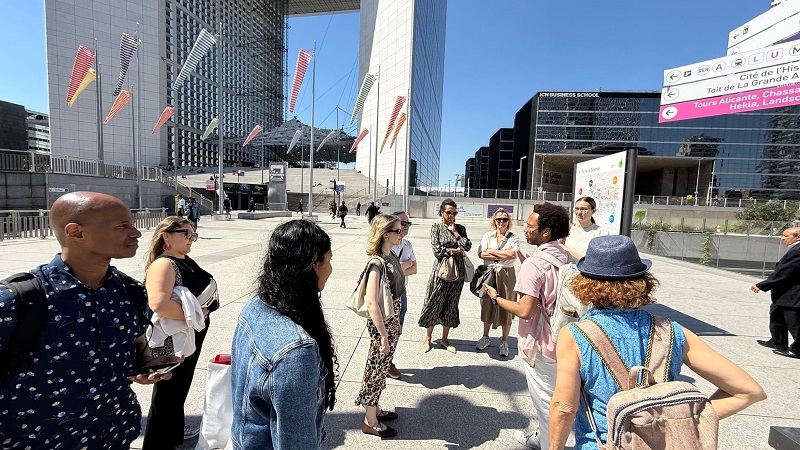Do you dream of enrolling in a university or a grande école in France and experiencing the high standard of French higher education?
Located in the heart of Paris, École Suisse has been supporting international students in achieving their academic goals for nearly 100 years. Specialising in French as a Foreign Language (FLE), our school offers tailored programmes for all levels (A1 to C1, aligned with the CEFR). These include dedicated tracks that prepare students efficiently for official exams like the DELF and DALF, often required for admission to French higher education institutions.

Why Study in France?
Every year, France attracts thousands of international students from around the world. In 2024 alone, almost 500,000 students were drawn by the quality of its higher education and its rich cultural heritage. Many recognise the excellence of French education, especially in fields like science, arts, law, and business.
Beyond academic prestige, studying in France immerses you in a globally renowned culture—gastronomy, art de vivre, and historic landmarks. Choosing to study here means experiencing life “à la française” while elevating your French language skills.

What are the Types of Institutions for International Students?
French Universities
French universities welcome a large number of international students. They are easily accessible and offer programmes in almost every field—Bachelor’s, Master’s, or Ph.D. degrees. French university degrees enjoy global recognition, making them ideal for bolstering your academic background abroad.
Grandes Écoles
French grandes écoles are prestigious private institutions—such as business schools, engineering schools, or specialised institutions like Sciences Po for journalism. These schools are highly selective with limited spots, offering elite-level education.
BTS and Technical Training
France also offers professional programmes such as the BTS (Brevet de Technicien Supérieur), accessible to international students. These programmes often include internships, offering a practical bridge between theory and professional integration — either in France or in your home country.

Admission Requirements for Studying in France
Admission criteria for French higher education vary by institution, but most require:
- Transcripts from prior education
- Diplomas translated into French
- One or more letters of recommendation
- Passing an admissions test or specific evaluation
- Attending a motivational interview
- Submitting a recognised French language test
French language proficiency is essential for international students—even for programs taught in English. Most courses require an intermediate to advanced level of French. It enhances both your academic performance and your integration into your daily life in France.
Accepted French Language Tests
Accepted tests include:
- DELF – widely recognised internationally. Required level: usually DELF B2
- DALF C1 – for advanced-level proof; often required for selective programmes like grandes écoles or specialized Master’s
- Other accepted certificates: TCF (Test de Connaissance du Français), TEF (Test d’Évaluation du Français)
The DELF Exam – Official French Language Certification
The DELF (Diplôme d’Études en Langue Française) is an internationally recognized official French language exam designed for beginner to intermediate learners of French. It is one of the most common French certifications required for non-native speakers. If you're planning to study in France, most universities and higher education institutions require the DELF B2 level, in accordance with the Common European Framework of Reference for Languages (CEFR).
The DALF Exam – Advanced French Proficiency Test
The DALF C1 (Diplôme Approfondi de Langue Française) is also an internationally recognized official French language test, but unlike the DELF, the DALF is intended for advanced speakers. It assesses high-level French proficiency (levels C1 and C2 on the CEFR scale). Passing the DALF C1 exam demonstrates excellent command of the French language in academic, professional, and everyday contexts. It is often required for admission into selective programs such as elite French “grandes écoles” or specialized Master’s degrees.
Other Accepted French Language Tests for Studying in France
In addition to the DELF and DALF, there are other recognized French language proficiency tests accepted by French institutions, including:
- TCF (Test de Connaissance du Français) – a general test of French language knowledge;
- TEF (Test d’Évaluation du Français) – often used for academic and immigration purposes.
Comparative table of French language tests
| Test | French Proficiency Levels | Validity | Recognition | Format |
|---|---|---|---|---|
|
DELF |
A1 to B2 | Lifetime |
Recognized worldwide; often required for university admission in France (B2 level) |
Written + Oral exams |
| DALF Diplôme Approfondi de Langue Française |
C1 to C2 | Lifetime |
Internationally recognized; required by some top-tier schools and specialized Master’s programs |
Written + Oral exams |
| TCF Test de Connaissance du Français |
A1 to C2 | 2 years | Accepted for Campus France registration and student visa applications |
Multiple-choice (MCQ) + Written and Oral expression |
| TEF Test d’Évaluation du Français |
A1 to C2 | 2 years | Valid for applying to undergraduate programs in France |
Multiple-choice (MCQ) + Additional written/oral sections |
At L’École Suisse Internationale, we offer tailor-made programs to help you prepare for the official French language exams.
► DÉCOUVREZ NOS COURS DE PRÉPARATION AU DELF ET DALF
Steps to Study in France as an International Student
If you're an international student aiming to study in France, it's important to start the application process several months before the academic year begins. Admissions typically open as early as January for a September intake.
Here are the 3 key steps to prepare your application:
1. Validate Your French Language Level
You can choose to register directly for the test of your choice (DELF, DALF, TCF, or TEF), or you may prefer to take French preparation courses to boost your skills and aim for a B2 or C1 level.
2. Register on Campus France
Campus France is the official platform for submitting applications to French higher education institutions. You’ll need to upload your diplomas, transcripts, and language proficiency certificates.
3. Apply for Your Student Visa
- Once admitted, you must apply for a student visa through the French consulate in your home country. The VLS-TS (Long Stay Visa Serving as Residence Permit) allows you to study and live legally in France.
Study Smart: Join Our French Exam Preparation Courses in Paris
Most French universities require proof of language proficiency. Not confident in your level? Our intensive French language courses can help you succeed!
At L’École Suisse Internationale, we welcome students year-round at our school in the heart of the 10th arrondissement in Paris. Our programs are custom-designed for success on the DELF and DALF exams, available in small groups or one-on-one sessions.
You’ll benefit from our experienced, certified teaching team, dedicated to supporting your progress every step of the way.
Online French Courses Also Available
Can’t travel to Paris? We also offer online courses to help you prepare for the DELF and DALF exams from anywhere in the world.
Why Choose Our French Exam Preparation Programs?
✅ Friendly atmosphere and personalized support
✅ Methods adapted for all levels (A1 to C2)
✅ Includes general French courses + targeted exam training
Ils ont suivi nos cours de préparation au DELF/DALF
Jan
![]() (Traduit) Très bonne expérience :
(Traduit) Très bonne expérience :
- Très bon rapport qualité prix
- petits groupes
- De nombreux professeurs différents et très bons
- secrétariat très serviable
- ambiance conviviale et familiale
- des excursions culturelles hebdomadaires
- Accompagnement de mon bilan de master (aide pour lettre de motivation, CV, etc.)
De septembre de l’année dernière jusqu’en mars, j’ai fréquenté l’École Suisse pour apprendre le français. Mon objectif était d'atteindre un niveau B2 pour pouvoir commencer un master à Paris à partir de septembre de cette année. J'ai entendu parler de différentes écoles de langues via Facebook et j'ai décidé de leur écrire une par une. Le secrétariat de l'École Suisse a répondu à mes questions rapidement et en détail et j'ai pu passer la même semaine pour jeter un œil à l'école. Lors de ce rendez-vous j'ai également pu passer un test écrit et avoir une conversation plus longue avec Thierry pour déterminer mon niveau actuel.
Pendant les six mois où j'ai été autorisé à fréquenter cette école, je n'ai jamais été dans une classe de plus de huit personnes. Nous étions généralement entre quatre et six par classe. Les professeurs changent tous les jours. En tant qu'étudiant, j'ai bénéficié des nombreuses approches pédagogiques différentes des professeurs, qui avaient toutes leur propre style et étaient très bonnes. Dans l'ensemble, l'École Suisse accorde une grande importance à l'applicabilité de ce qui a été appris, la grammaire nécessaire est appliquée directement dans les exercices oraux et, dans l'ensemble, les gens sont encouragés à parler beaucoup en classe. Vous avez donc appris le plus en parlant beaucoup et en demandant à vos professeurs de signaler vos erreurs. En plus de la grammaire, vous apprenez également du vocabulaire thématique grâce à des exercices, vous lisez ensemble des textes français et en discutez, vous écoutez ensemble des reportages radio et répondez à des questions de compréhension et des tâches d'écriture vous sont confiées. L'École Suisse propose du matériel de travail adapté et utile pour chaque niveau de langue. J'ai trouvé étonnant de voir comment nous pouvions lire ensemble des textes complets en classe en peu de temps.
Les camarades de classe venaient de partout et de tous les âges et au cours des nombreuses discussions et conversations en classe et en dehors, nous avons très bien fait connaissance. La particularité de l'École Suisse est la grande salle commune. Tous les étudiants et enseignants se réunissent ici pendant la pause café du matin.
Vous parlez comme si vous étiez à une fête. La timidité que tout le monde éprouve à parler français disparaît généralement dès le premier jour. Vous pouvez rapidement vous parler français et améliorer vos compétences en dehors des cours. J'ai particulièrement apprécié le déjeuner à l'école. Chacun apporte quelque chose à manger, puis nous nous asseyons ensemble à la grande table et avons diverses conversations avec les professeurs et les camarades de classe. Vous serez surpris de découvrir ce dont vous pouvez déjà parler en français et ce que vous comprenez soudainement. Ce rendez-vous convivial et familial est également favorisé par les sorties culturelles communes tous les mercredis. Ici, bien sûr, on ne va pas à la Tour Eiffel ou dans un autre lieu très touristique, mais au vrai Paris, s'il vous plaît. Aux beaux jours, vous parcourez la ville ensemble et découvrez des lieux comme les passages couverts ou la coulée verte. Quand le temps est mauvais, nous allons ensemble aux expositions et aux différents studios.
À l'École Suisse, j'ai également bénéficié d'un soutien important pour ma candidature au master. Dès le début, j'ai pu échanger avec les professeurs sur les différentes universités et ils leur ont fait prendre conscience des délais d'inscription très précoces. Lorsque j'ai enfin commencé à rédiger mon dossier de candidature, j'ai rencontré presque tous les jours Véronique, avec qui j'ai rédigé ma première lettre de motivation et traduit mon CV. (Avril 2023)
Ready to Study at a French University but Worried About Your French Level?
Start your success journey now with our intensive French courses in Paris.
► Sign Up for the Program
FAQ: How to Get Into a French University as an International Student
What level of French is required to study in France?
Most universities require a B2 level, while top institutions or grandes écoles may demand C1.
Which test should I take to prove my French level?
The DELF (for intermediate learners) and DALF (for advanced learners) are the most widely accepted exams. They’re valid for life and recognized worldwide.
How long does it take to get a student visa for France?
It typically takes 8 to 12 weeks. You’ll need:
- A valid passport
- Proof of admission to a French school
- Recent diplomas or transcripts
- Proof of financial means
- Accommodation confirmation
- Health insurance
What’s the difference between a university and a grande école?
Universities offer broader, general programs.
Grandes écoles are more specialized and selective.
Where can I take my French language test?
The DELF and DALF exams are offered several times per year at authorized test centers worldwide. Find a center near you.
Can I study in France without speaking French?
Some programs are taught entirely in English. However, most higher education courses are in French, and strong language skills are key to both academic success and cultural integration.
How long does it take to reach B2 in French?
If you're a complete beginner, an intensive immersion course can help you reach B2 level in 8 to 12 months, with consistent personal study alongside classes.
Why take a preparation course for the DELF exam?
Preparation courses not only help you progress in all areas of French (speaking, writing, listening, reading) but also train you in the exam methodology, which can boost your score significantly. Our experienced teachers are experts in exam strategies and know what it takes to succeed.